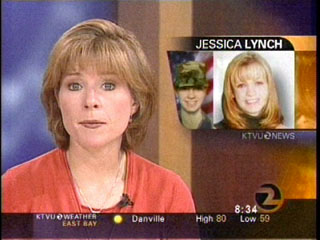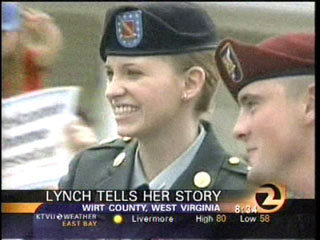According to the Iraqi doctors who first examined her, Jessica Lynch had no shot or stab wounds.
Her life was saved by the brave medical staff of an Iraqi hospital — whose members even donated their own blood when there was none on hand.
The military staged the whole “rescue” to give the cameras something to look at.
As far as the Shrub Administration is concerned, if all goes well, this rescue of Jessica Lynch was just the first of many “episodes” of these kinds of wars — coming soon to a TV channel near you.
Ripping yarns: how they ‘saved’ Private Lynch
Jessica Lynch became an icon of the war in Iraq. The story of her capture by the Iraqis and her rescue by US Special Forces became one of the great patriotic moments of the conflict. It couldn’t have happened at a more crucial moment, when the talk was of coalition forces bogged down, of a victory too slow in coming.
Her rescue, however, will go down as one of the most stunning pieces of news management conceived. It provides a remarkable insight into the real influence of Hollywood producers on the Pentagon’s media managers, and has produced a template from which America hopes to present its future wars.
But the American media tactics, culminating in the Lynch episode, infuriated the British, who were supposed to be working alongside them in Doha, Qatar. Tonight in Britain, the BBC’s Correspondent program reveals the inside story of the rescue that may not have been as heroic as portrayed, and of divisions at the heart of the allies’ media operation…
One story, two versions. The doctors in Nassiriya say they provided the best treatment they could for Lynch in the midst of war. She was assigned the only specialist bed in the hospital, and one of only two nurses on the floor. “I was like a mother to her and she was like a daughter,”says Khalida Shinah.
“We gave her three bottles of blood, two of them from the medical staff because there was no blood at this time,”said Dr Harith al-Houssona, who looked after her throughout her ordeal. “I examined her, I saw she had a broken arm, a broken thigh and a dislocated ankle. Then I did another examination. There was no [sign of] shooting, no bullet inside her body, no stab wound – only RTA, road traffic accident,” he recalled. “They want to distort the picture. I don’t know why they think there is some benefit in saying she has a bullet injury.”
The doctors said that the day before the special forces swooped on the hospital the Iraqi military had fled. Hassam Hamoud, a waiter at a local restaurant, said he saw the American advance party land in the town. He said the team’s Arabic interpreter asked him where the hospital was. “He asked: ‘Are there any fedayeen over there?’ and I said, ‘No.”‘ All the same, the next day “America’s finest warriors” descended on the building.
“We heard the noise of helicopters,” says Dr Anmar Uday. He says that they must have known there would be no resistance. “We were surprised. Why do
this? There was no military, there were no soldiers in the hospital.
“It was like a Hollywood film. They cried, ‘Go, go, go’, with guns and blanks and the sound of explosions. They made a show – an action movie like Sylvester Stallone or Jackie Chan, with jumping and shouting, breaking down doors.” All the time with the camera rolling. The Americans took no chances, restraining doctors and a patient who was handcuffed to a bed frame.
There was one more twist. Two days before the snatch squad arrived, Al-Houssona had arranged to deliver Jessica (pictured left) to the Americans in an ambulance. “I told her I will try and help you escape to the American army but I will do this very secretly because I could lose my life.” He put her in an ambulance and instructed the driver to go to the American checkpoint. When he was approaching it, the Americans opened fire.
They fled just in time back to the hospital. The Americans had almost killed their prize catch…
None of the details that the doctors provided Correspondent with made it to the video or to any subsequent explanations or clarifications by US authorities. A Pentagon spokesman in Washington, Bryan Whitman, declined to release the full tape of the rescue, rather than its edited version. He would not talk about what kind of Iraqi resistance the American forces faced. Nor would he comment on the injuries Lynch actually sustained. “I understand there is some conflicting information out there and in due time the full story will be told, I’m sure,” he said…
He acknowledged that the events surrounding the Lynch “rescue” had become a matter of “conjecture”. But “either way, it was not the main news of the day. This was just one soldier, this was an add-on: human interest stuff”.-”
The American strategy was to concentrate on the visuals and to get a broad message out. The key was to ensure the right television footage. The embedded reporters could do some of that. On other missions, the military used their own cameras, editing the film themselves and presenting it to broadcasters as ready-to-go packages. The Pentagon had been influenced by Hollywood producers of reality TV and action movies, notably Black Hawk Down.
In 2001, the man behind Black Hawk Down, Jerry Bruckheimer, had visited the
Pentagon to pitch an idea. Bruckheimer and fellow producer Bertram van Munster, who masterminded the reality show Cops, suggested Profiles from the Front Line, a primetime television series following US forces in Afghanistan. They were after human stories told through the eyes of the soldiers. Van Munster’s aim was to get close and personal.
It was perfect reality TV, made with the co-operation of Donald Rumsfeld and aired just before the Iraqi war. The Pentagon liked what it saw. “What Profiles does is give another, in-depth, look at what forces are doing from the ground,” says Whitman. That approach was developed in Iraq.
The Pentagon has none of the British misgivings about its media operation. It is convinced that what worked with Jessica Lynch and with other episodes of this war will work even better in the future.
Continue reading →




